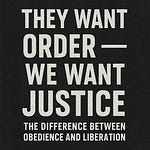Overview:
This episode reclaims a vision of the divine rooted not in blood, punishment, or appeasement—but in presence, compassion, and relationship. We challenge the dominant narrative that suffering is a requirement for holiness and explore how systems of sacrifice have been used to justify oppression, from the altar to the legislature.
What if God doesn’t need suffering? What if love was never meant to be proven through pain?
In This Episode:
The historical and theological roots of sacrifice in Western religion
Why the idea of a wrathful god feeds authoritarian power structures
The cost of believing that suffering redeems us
How reclaiming a God of mercy reshapes justice, policy, and personhood
What it means to unlearn inherited beliefs about pain, purity, and power
Key Concepts Covered:
Substitutionary atonement vs. restorative love
How sacrificial theology underpins punitive systems (e.g., incarceration, austerity)
The difference between transformational growth and institutional harm
The emotional and cultural legacy of sacrifice as proof of worth
Featured Frameworks:
12 Utilities: Systems that demand sacrifice often fail to deliver fairness, safety, or dignity
PERMAH: True flourishing doesn’t require suffering first—it grows from stability and connection
Prospect Theory: Why people tolerate harm when told it’s redemptive or deserved
Admiration Equation: Awe does not require agony. We admire goodness, not cruelty cloaked in righteousness
Memorable Quote:
“If your God requires blood to love you, maybe it’s not love. Maybe it’s control.”
Reflection Prompt:
What if the divine has never asked you to suffer to prove your worth?
How would your life—and your faith—change?













Share this post